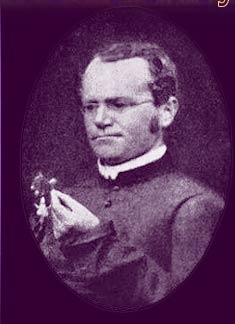












|

Gregor Mendel is widely credited with formulating the basic laws of heredity: Hereditary factors do not mix but remain segregated; some factors are dominant, while others are recessive; each parent lends only half of his or her hereditary information to his or her progeny; and different offspring of the same parents have different sets of hereditary information.
|
 |

1822-1884 Gregor Mendel
Gregor Mendel, an Austrian scientist who lived and conducted much of his most important research in a Czechoslovakian monastery, established the basis of modern genetic science. He experimented on pea plants in an effort to understand how a parent passed physical traits to its offspring. In one experiment, Mendel crossbred a pea plant with wrinkled seeds and a pea plant with smooth seeds. All of the hybrid plants produced by this union had smooth seeds. During years of painstaking research, Mendel bred more pea plants with different select traits, such as blossom color, pod color and shape, and pod position.
After studying the data from these experiments, Mendel concluded that physical traits are passed to offspring through genetic factors called alleles. Each parent had not one but two alleles for each trait. Two alleles (one from each parent) interact to produce the final physical characteristics of an offspring. While previous conceptions of heredity suggested that specific characteristics from each parent blend together in the offspring, Mendel deduced that heredity depends on contributions from both parents, which compete randomly for expression in the offspring. Mendel's research proved that each of the two alleles for a
given trait that parents transmit to their offspring can be
either dominant (a trait certain to appear if one or both
alleles are dominant) or recessive (a trait that is masked
unless both alleles are recessive).
|
 |